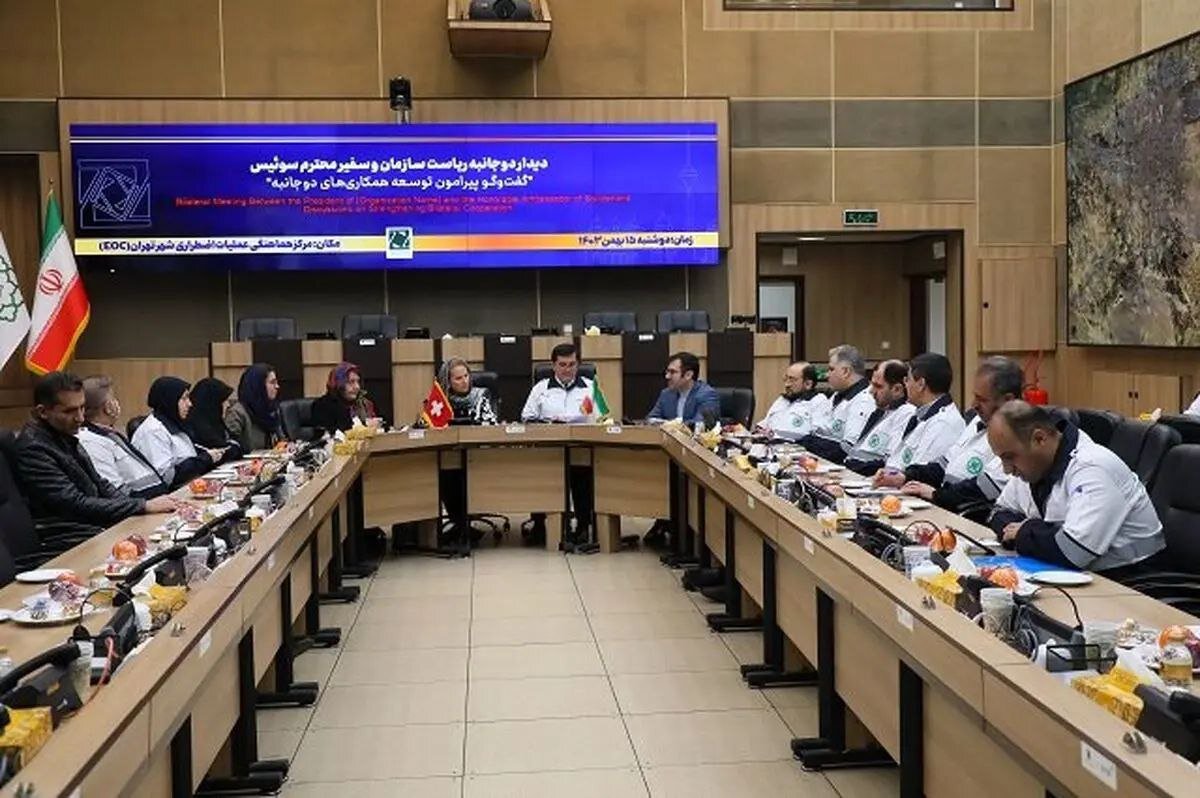Bern ready to expand co-op with Tehran in crisis management

TEHRAN – Swiss ambassador to Tehran, Nadine Olivieri Lozano, in a meeting with the president of Tehran Disaster Mitigation and Management Organization (TDMMO), Ali Nasiri, has voiced Switzerland's readiness to enhance relations with Tehran in crisis management.
During the meeting held on Tuesday in Tehran, the official paid a visit to TDMMO, and said “taken measures in crisis management in Tehran are incredible; we welcome establishing a joint workgroup to share expertise and experiences in crisis management,” ILNA reported.
For his part, Nasiri highlighted the significance of collaborations with international communities saying that many of the taken measures are the result of joint activities that are ongoing.
Referring to the establishment of durability groups as a successful outcome of former cooperation with Switzerland, Nasiri said the members of these groups have raised from 14,000 to 50,000 over the past three years.
The official went on to say that Tehran is exposed to different hazards including earthquakes, floods, fires, air pollution, storms, drought, landslides, and subsidence. Nasiri also elaborated on the steps taken to increase safety such as securing abandoned pits, optimizing crisis management supportive bases, improving the safety of 66 priority bridges, and enhancing the resilience of Tehran as a metropolis through seismic retrofit.
Developing accelerometer and seismographic networks, assessing the safety of important and high-rise buildings, implementing a collapse program, managing meteorological risks, conducting operational and table-top exercises, and launching health, safety, environment (HSE) secretariat are among other carried out actions, as well as drafting and revising the HSE guidelines, he noted.
Reinforcing cooperation can improve crisis management
In September 2024, the former head of the crisis management organization said reinforcing cooperation among the ECO member states in prediction, prevention, preparation, response, reconstruction, and rehabilitation fields can greatly boost the efficiency of crisis management.
“Currently, the world is facing severe challenges, the most important of which include climate change, water scarcity (particularly fresh and safe water), lack of green spaces, and desertification, IRNA quoted Mohammad-Hassan Nami as saying.
He made the remarks at the 9th ECO Ministerial Meeting on Disaster Risk Reduction which was held on September 17, 2024 in Dushanbe. The event was hosted by the Committee of Emergency Situations and Civil Defense of Tajikistan.
Regarding the availability of valuable technologies in crisis management, Nami proposed the appropriate use of intelligent systems for correct data analysis to be put on the agenda to further advance the goals of the countries.
The official noted that access to authentic and reliable information related to risks is the basis for making quick, accurate, effective, and timely decisions in handling emergency situations and reducing financial and life losses. However, a substantial part of the risks is not limited to geographical borders.
It is essential for ministries and emergency organizations of the ECO member countries to act in the form of coherent information systems and intelligent systems to timely analyze and evaluate data, and issue warnings to responsible organizations.
In this regard, Iran has made a centralized and coordinated effort to identify risk data nationally and share it with the executive bodies of the country. Consequently, the country has gained successful experiences in the management of earthquake risk reduction, flood control, subsidence, landslide, water stress, drought and frost, fire, fine dust, cold, and heat waves, Nami added.
Regarding the fact that parts of the ECO member states are located in arid and desert regions, it is critical to enhance collaborations on implementing effective measures to address the following issues:
Preparing regional geological risk maps; managing shared water resources to prevent the disruption of the regional ecosystem; training and conducting joint governmental and community-oriented practices and maneuvers; establishing a joint expert group to cooperate activities among members, reinforcing cooperation in forecasting weather conditions, issuing early warnings and rapid response; as well as sharing new technologies.
MT/MG
Leave a Comment